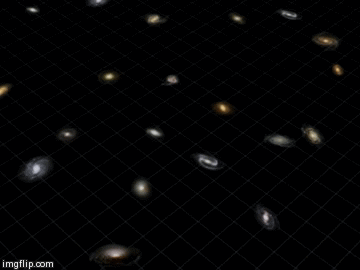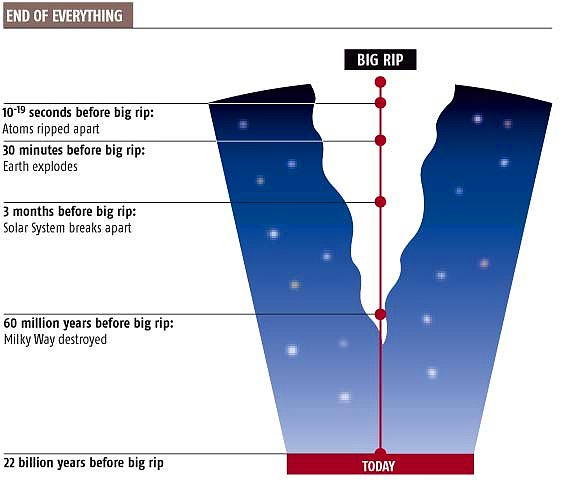“Why do people have to be this lonely? What’s the point of it all? Millions of people in this world, all of them yearning, looking to others to satisfy them, yet isolating themselves. Why? Was the earth put here just to nourish human loneliness?” -Haruki Murakami
Of all the ways our Universe can end -- recollapsing into a firey singularity, freezing out into a cold, icy void -- perhaps the scariest conceivable fate is one where galaxies are ripped apart, stripped of their stars, where planets come undone, molecules and atoms are torn away from one another and, at last, spacetime itself is destroyed.
 Image credit: Greg Bacon (STScI) / Hubblesite.org, converted at imgflip, original from http://imgsrc.hubblesite.org/hu/db/videos/hs-2004-12-c-high_quicktime.m….
Image credit: Greg Bacon (STScI) / Hubblesite.org, converted at imgflip, original from http://imgsrc.hubblesite.org/hu/db/videos/hs-2004-12-c-high_quicktime.m….
Sounds like something right out of a sci-fi horror novel, doesn't it? Only, it may not be fiction after all, it's one possible fate of our Universe: the Big Rip!
 Image credit: New Scientist, 2003, via http://www.newscientist.com/article/dn3461-phantom-menace-may-rip-up-co….
Image credit: New Scientist, 2003, via http://www.newscientist.com/article/dn3461-phantom-menace-may-rip-up-co….

What would a graph or the Hubble Constant v. time look like? Right now it's about 68km/sec/Mpsec. What was it just after the Big Bang? What was it just before it began increasing about 6 billion years ago?
Thanks for a great blog.
I know the data is against it, but would a big-crunch contraction be stable, contracting to a point singularity, or would some instability acting on nonuniformity break it up into a myriad of local crunches? Its tough to maintain the symmetry of an implosion, but maybe the physics/mathematics of spacetime precludes this?
@1 Ruchard
like this
http://scienceblogs.com/startswithabang/files/2012/07/990350b.jpeg
So how might the onset of this scenario affect the fields that exist. As a favorite physicist, Matt Strassler, constantly emphasizes, the universe is best thought of as being composed of fields rather than the particles that reside in them.
Could such an intense expansion begin to separate virtual particles as they occur, thus populating the increasing void with an increasing particle/anti-particle soup - a cold version of the mix we had at baryogenesis?
To be more specific, I was referring to the particle-antiparticle pairs produced by quantum fluctuations in the vacuum.
Image credit: Wikipedia’s Big Rip page, via http://en.wikipedia.org/wiki/Big_Rip.
Although do be warned that, to the best of our knowledge, w = -1, exactly, and if that turns out to be the case, there will be no Big Rip ever. And that’s where I’d place my money if I were a betting man, although it’s important to remember that this is science, and we do not rule out any possibilities, no matter how distateful we may find them, until the evidence allows us to do so.
Dang! Eqn blows up!! Math is oracular!!!
God's cosmos(es?) - tailormade for us.
Testing my understanding: to the best of our knowledge the galaxies are getting farther away faster, i.e.: the universe is expading faster, but not fast enough for the big rip. Is that right?
If that is the case then in the future, observers in one galaxy won't be able to see the other galaxies in the universe, right? If a civilization like ours was to appear at such time will they be able to reach the same scientific history of the universe that we have now? I mean knowing the physics that we know today? Won't they be "forced" to reach the conclusion that their galaxy was the whole universe? Will they be able to detect/measure the expasion of the universe?
Thanks for the great blog!
@7 Paulo
yes, you are correct. In that scenario.. you are left with island galaxies and nothing but empty space in all directions (to our current understanding of dark energy and expansion). That future civilization wouldn't be able to reconstruct our epoch because they would not see anything except their own galaxy.